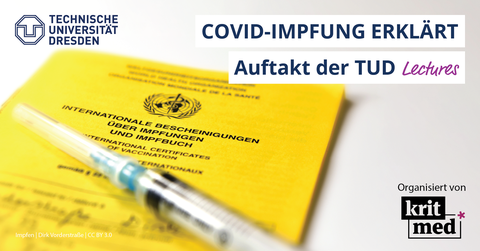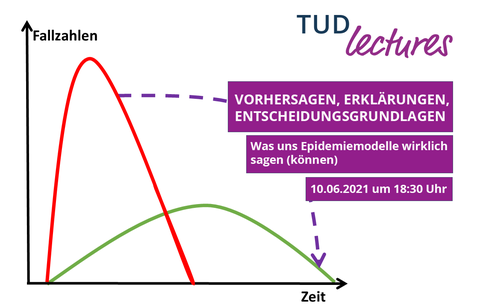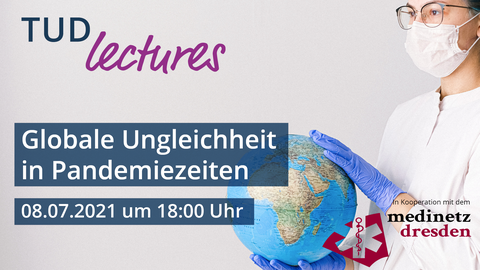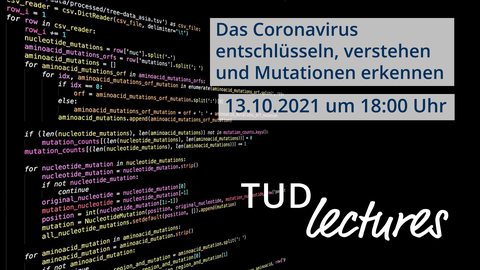TUD Lectures "Corona"
2021 startete das Dezernat Universitätskultur die Veranstaltungsreihe TUD Lectures, in welcher Expert:innen verschiedenster Disziplinen der TU Dresden aktuelle Themen unter die Lupe nehmen. In bis zu 1 1/2-stündigen Vorträgen präsentieren die Expert:innen ihr Wissen anschaulich und verständlich. Die TUD Lectures richten sich an die TUD Gemeinschaft und alle Interessierten.
Inhaltsverzeichnis
- Corona Lectures
- Covid-Impfung erklärt - Fragen und Antworten zu den wichtigsten Impfstoffen
- Vorhersagen, Erklärungen, Entscheidungsgrundlagen - Was uns Epidemiemodelle wirklich sagen (können)
- Globale Ungleichheit in Pandemiezeiten
- Das Coronavirus entschlüsseln, verstehen und Mutationen erkennen
- Psychische Belastung von Kindern während der Coronazeit
- Corona Lectures
Corona Lectures
Alle leiden unter den Belastungen der nun schon über ein Jahr andauernden Pandemie-Situation. Aktuell beschäftigen sich viele Menschen - an unserer Universität und in unserer Region mit Fragestellungen rund um Corona. Das Ressort Universitätskultur startet vor diesem Hintergrund mit einer neuen Vortragsreihe, den TUD Lectures mit der Corona-Pandemie als erstem Schwerpunktthema.
Covid-Impfung erklärt - Fragen und Antworten zu den wichtigsten Impfstoffen
Trotz vielfach neueingerichteter Podcasts, zahlreicher Artikel und Bemühungen, leichte Erklärungen abzugeben, fällt doch immer wieder auf, dass es Verunsicherungen zu Corona-Themen, wie der Impfung gibt und eine einfache Antwort oft gar nicht so naheliegt. Mit der Medizinischen Fakultät hat die TUD hervorragende Expertise im eigenen Haus, so dass die erste TUD Lecture dieses hochaktuelle Thema beleuchtete.
Prof. Alexander Dalpke, der in seinem Vortrag Antworten zu den am häufigsten gestellten Fragen im Zusammenhang mit den neuen Impfstoffen gegen SarsCov2 gab, leitet seit 2019 das Institut für Medizinische Mikrobiologie und Virologie am Universitätsklinikum Dresden. Er betreute federführend eine große Studie zur Ansteckung mit SarsCoV2 an Dresdner Schulen und ist regelmäßiger Gast im Corona Podcast der Sächsischen Zeitung.
Moderiert wurde die erste TUD Lecture, die am 10. Mai 2021 virtuell stattfand, durch Mitglieder der Hochschulgruppe KritMed* Dresden, die sich kritisch mit verschiedenen medizinpolitischen Themen auseinandersetzt und die Veranstaltung initiierte. In der aktuellen Situation beschäftigt sich KritMed* Dresden besonders mit solidarischem Handeln in der Pandemie.
Fragen und Antworten zur Covid-Impfung © TUD/Medizinische Fakultät
Über 870 Interessierte lauschten dem Vortrag von Prof. Dalpke und stellten über den Chat ihre Fragen. Da auch im Nachgang zur Veranstaltung zahlreiche Fragen gestellt wurden, beantwortete Prof. Alexander Dalpke die am häufigst gestellten Fragen in dem hier verfügbaren Video (Stand: 19.05.2021).
Bitte beachten Sie, dass Daten, Erkenntnisse oder Neuerungen zu Covid-Impfungen, die nach dem 19.05.2021 veröffentlicht wurden, nicht in die Antworten einfließen konnten. Herr Professor Dalpke ist auch regelmäßiger Gast im CoronaCast der Sächsischen Zeitung. Den Podcast können Sie auf dieser Seite nachhören.
Vorhersagen, Erklärungen, Entscheidungsgrundlagen - Was uns Epidemiemodelle wirklich sagen (können)
Seit Beginn der Corona-Pandemie stützten sich politische Entscheidung mit weitreichenden gesellschaftlichen Folgen unter anderem auf die Prognosen aus mathematischen Modellen. Der 2. Vortrag in der TUD Lecture-Reihe zur Corona-Pandemie gab Einblicke in die der Öffentlichkeit eher unbekannte Welt von Modellen und trug den Titel „Vorhersagen, Erklärungen, Entscheidungsgrundlagen - Was uns Epidemiemodelle wirklich sagen (können)“. Am 10.06.2021 um 18:30 Uhr beschäftigten sich zwei Professoren der TU Dresden mit Fragen wie: Was sind mathematische Modelle? Welche Interpretationen lassen sie zu? Inwieweit kann und sollte man den Vorhersagen vertrauen? Welche Stärken haben Modelle, welche Grenzen?
Die Referenten der Veranstaltung waren Prof. Andreas Deutsch, Zentrum für Informationsdienste und Hochleistungsrechnen an der TU Dresden, und Prof. Ingo Röder, Professor für Medizinische Statistik und Biometrie an der Medizinischen Fakultät Carl Gustav Carus der TU Dresden.
Vorhersagen, Erklärungen, Entscheidungsgrundlagen - Was uns Epidemiemodelle wirklich sagen (können) © TUD
Die Veranstaltung fand virtuell statt. Falls Sie nicht zu einem der 170 Zuschauer:innen gehörten oder die Veranstaltung erneut schauen wollen, ist die ab sofort möglich.
Globale Ungleichheit in Pandemiezeiten
Die 3. TUD Lecture fand am 08.07.2021 statt. Den Vortrag mit dem Titel „Globale Ungleichheit in Pandemiezeiten“ hat Prof. Dr. Anna Holzscheiter gehalten. Sie hat seit 2019 die Professur für Politikwissenschaft mit dem Schwerpunkt Internationale Politik an der Philosophischen Fakultät inne. Ihr Vortrag befasste sich mit globaler Ungleichheit beim Zugang zu Gesundheitssystemen (einschließlich lebensnotwendiger Medikamente wie beispielsweise Impfstoffe). Sie diskutierte Chancen und Grenzen internationaler Zusammenarbeit zur Beseitigung dieser Ungleichheit, insbesondere mit Blick auf den Fachkräftemangel im Gesundheitsbereich und die damit verbundene Arbeitsmigration.
Moderiert wurde die Veranstaltung auch dieses Mal durch eine Hochschulgruppe. Der Verein Medinetz Dresden vermittelt medizinische Versorgung an Menschen ohne Zugang zum Gesundheitssystem. Die Behandlung erfolgt anonym und kostenlos. Darüber hinaus ist politische Arbeit eine weitere Domäne des Vereins, wobei auf das übergeordnete Ziel sich selbst abzuschaffen, hingearbeitet wird.
Globale Ungleichheit in Pandemiezeiten © TUD
Falls Sie die Veranstaltung verpasst haben oder sie nochmal anschauen wollen, ist das ab sofort möglich.
Als Ressort Universitätskultur sind wir bestrebt, allen einen möglichst einfachen Zugang zu unseren Veranstaltungen zu eröffnen. Sollten Sie Unterstützung, etwa durch einen Gebärdendolmetschdienst, in Anspruch nehmen wollen, zögern Sie bitte nicht, uns über die Mailadresse zu kontaktieren.
Das Coronavirus entschlüsseln, verstehen und Mutationen erkennen
Die Inzidenz-Werte sinken, die Zahl der Geimpften und Genesenen steigt. Ein Ende der Epidemie ist die große Hoffnung, doch Nachrichten über grassierende Mutationen mit teils schnellerer Virusübertragbarkeiten und höheren Sterbefallraten trüben die Aussichten auf Rückkehr in eine „Normalität“. Warum mutieren Vieren? Sind alle Mutationen gefährlich und wie lassen sich Mutationen herausfinden? Was bedeuten die Mutationen für die laufenden Impfungen? In der 4. TUD Lecture stellte sich Dr. Anna Poetsch dem Thema Virusentschlüsselung durch Genomsequenzierung und gab Antworten zu den am häufigsten gestellten Fragen.
Dr. Poetsch ist Forschungsgruppenleiterin am Biotechnologischen Zentrum (BIOTEC) der TU Dresden und des Nationalen Centrums für Tumorerkrankungen (NCT) gefördert durch das Mildred Scheel Nachwuchszentrum (MSNZ). Sie ist eine der Forscher:innen, die sich bereits seit Ausbruch der Pandemie mit einem Team von Volontären um die Sequenzierung des Coronavirus bemühen und versuchen dessen Evolution zu verstehen. Moderiert wurde die Veranstaltung von Dr. Maximilian Krause, Projektkoordinator und Dr. Fabian Rost, Biophysiker. Beide arbeiten am DRESDEN-concept Genome Center.
Sie haben die Veranstaltung verpasst oder wollen sie nochmals nachschauen. Kein Problem. Klicken Sie einfach auf die Videobox.
Das Coronavirus entschlüsseln, verstehen und Mutationen erkennen
Psychische Belastung von Kindern während der Coronazeit
Schülerinnen und Schüler waren während der vergangenen Monate eine der am meisten unter der Pandemie leidenden Gruppen. Digitaler Schulunterricht, das Wegfallen von sozialen Kontakten in der Freizeit, kein Sport und keine Freizeitaktivitäten mit dem Freundeskreis. Auch als es einige Lockerungen gab und Schüler:innen wieder zur Schule gehen durften, schwebte die Angst und Unsicherheit über den Köpfen, ob die eigene Klasse wieder in Quarantäne gehen muss oder ob man sich selbst ansteckt. Diese Zeit der Entbehrungen, der Einschränkungen und Verunsicherung gepaart mit den Herausforderungen des Heranwachsens sind für die psychische Entwicklung eines jeden Kindes eine Herausforderung.
Prof. Hendrik Berth, Leiter der Forschungsgruppe Angewandte Medizinische Psychologie und Medizinische Soziologie im eigenständigen Bereich für Psychosoziale Medizin und Entwicklungsneurowissenschaften am Dresdner Universitätsklinikum, und Dr. Christin Bohl, Wissenschaftliche Mitarbeiterin in dieser Forschungsgruppe, gaben in der TUD Lecturesreihe zu „Corona“ am 22.11.2021 um 18:00 Uhr Einblicke in ihre Forschungsergebnisse über die „Psychische Belastung von Kindern während der Coronazeit“.
Im Rahmen eines EU-geförderten Projektes, das sich mit dem Schutz des psychischen Wohlbefindens der Kinder während der Pandemiezeit auseinandersetzt, ist Prof. Berth mit Wissenschaftler:innen aus Griechenland, Spanien, Italien, Kroatien, Frankreich und Zypern in Kontakt. Im Ergebnis der Forschungsarbeit soll ein Schulungspaket für Lehrer:innen, Erzieher:innen und andere pädagogische Fachkräfte entstehen, das Lehr- und Lerntexte mit dazugehörigen Übungen, Präsentationen und Videos enthält.
Moderiert wurde die Veranstaltung von der Hochschulgruppe Balu und Du. Das bundesweite Mentoringprogramm fördert Grundschulkinder im außerschulischen Bereich. Junge, engagierte Leute übernehmen ehrenamtlich mindestens ein Jahr lang eine individuelle Patenschaft für ein Kind. Sie helfen diesen Kindern durch persönliche Zugewandtheit und aktive Freizeitgestaltung, sich in unserer Gesellschaft zu entwickeln und zu lernen, wie man die Herausforderungen des Alltags erfolgreich meistern kann. Während der Coronapandemie war die Hilfe der Mentor:innen besonders gefragt und benötigt.
Die Veranstaltung fand digital statt und kann nun nachgeschaut werden.





